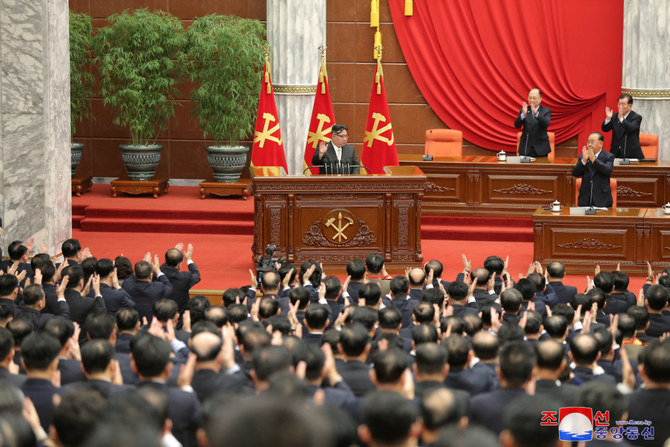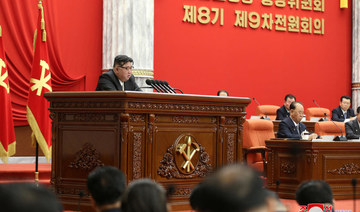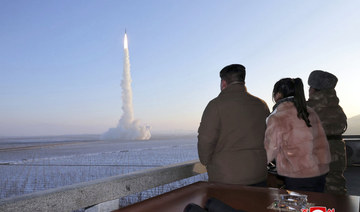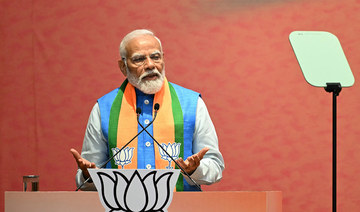SEOUL, South Korea: North Korea vowed to launch three new spy satellites, build military drones, and boost its nuclear arsenal in 2024 as leader Kim Jong Un said US policy is making war inevitable, state media reported on Sunday.
Kim also said he would no longer seek reconciliation and reunification with South Korea, in lengthy remarks wrapping up five days of ruling party meetings that set economic, military and foreign policy goals for the coming year.
“Because of reckless moves by the enemies to invade us, it is a fait accompli that a war can break out at any time on the Korean peninsula,” he said, according to state news agency KCNA.
He ordered the military to prepare to “pacify the entire territory of South Korea,” including with nuclear bombs if necessary, in response to any attack.
“I believe that it is a mistake that we should no longer make to consider the people who declare us as the ‘main enemy’... as a counterpart for reconciliation and unification,” KCNA cited Kim as saying during the meeting that ended Saturday.
At the meeting, Kim noted “a persisting uncontrollable crisis situation” on the peninsula, which he said was triggered by Seoul and Washington.
Inter-Korean relations are in a poor state as Seoul and Washington have ramped up defense cooperation this year in the face of a record-breaking series of weapons tests by Pyongyang.
Kim’s speech comes ahead of a year that will see pivotal elections in both South Korea and the United States.
Experts predict North Korea will maintain a campaign of military pressure to try to increase any leverage around the US presidential elections in November, which could see the return of former President Donald Trump, who traded in both threats and historic diplomacy with Kim.
“Pyongyang might be waiting out the US presidential election to see what its provocations can buy it with the next administration,” said Leif-Eric Easley, professor of international studies at Ewha Womans University in Seoul.
The administration of US President Joe Biden says it is open to talks, but it imposed new sanctions as North Korea pushed ahead with more banned missile tests. The US also increased drills and deployed more military assets such as nuclear-armed submarines and large aircraft carriers near the Korean peninsula.
Kim said he could not overlook the return of such weapons which he said had completely transformed South Korea into a “forward military base and nuclear arsenal” of the United States.
“If we look closely at the confrontational military actions by the enemy forces .... the word ‘war’ has become a realistic reality and not an abstract concept,” Kim said.
Kim said he has no choice but to press forward with his nuclear ambitions and forge deeper relations with other countries that oppose the United States. North Korea has deep ties with both China and Russia.
South Koreans will also go to the polls in April for a parliamentary election that could impact the domestic and foreign agenda for conservative President Yoon Suk Yeol, who has maintained a hawkish stance toward Pyongyang.
South Korea’s National Intelligence Service (NIS) warned on Thursday that “there is a high possibility that North Korea could unexpectedly conduct military provocations or stage a cyberattack in 2024, when fluid political situations are expected with the elections.”
Pyongyang has now ruled out the possibility of unifying with South Korea, and the country must fundamentally change its principle and direction toward South Korea, Kim said.
“North-South relations are no longer a kinship or homogeneous relationship but have completely become a relationship between two hostile countries, two belligerents at war,” he said, calling the South a colonized state completely dependent on the United States for national defense and security.
Kim also promised to nurture the economy including metals, chemicals, power, machinery and railway transportations while modernizing wheat facilities to boost production.
One key policy goal is to invest in science and technological research at schools, he said.
MILITARY TECHNOLOGY
In the past year, North Korea says it successfully launched its first military spy satellite and test fired new solid-fuel intercontinental ballistic missiles (ICBMs) seen as having the range to deliver a nuclear warhead to anywhere in the United States.
A new reactor at North Korea’s Yongbyon nuclear complex appears to be operating for the first time, the UN nuclear watchdog and independent experts said this month, which would mean an additional potential source of plutonium for nuclear weapons.
North Korea has not tested a nuclear weapon since 2017 but in recent years has taken steps to resume operations at its testing site.
Kim said 2024 would see further military development, including strengthening the nuclear and missile forces, building unmanned drones, expanding the submarine fleet and developing electronic warfare capabilities.
The fleet of spy satellites would represent the first such capability for the North.
That successful launch was preceded by two failed attempts last year when its new Chollima-1 rocket crashed into the sea.
The move raised regional tensions and sparked fresh sanctions from the US, Australia, Japan and South Korea. Pyongyang has yet to release any imagery from the new satellite, leaving analysts and foreign governments to debate its capabilities.
The apparent success also came after Russian President Vladimir Putin promised to help North Korea build satellites. South Korean officials said Russian aid likely made a difference in the success of the mission, though experts said it was unclear how much help Moscow could have provided.



























